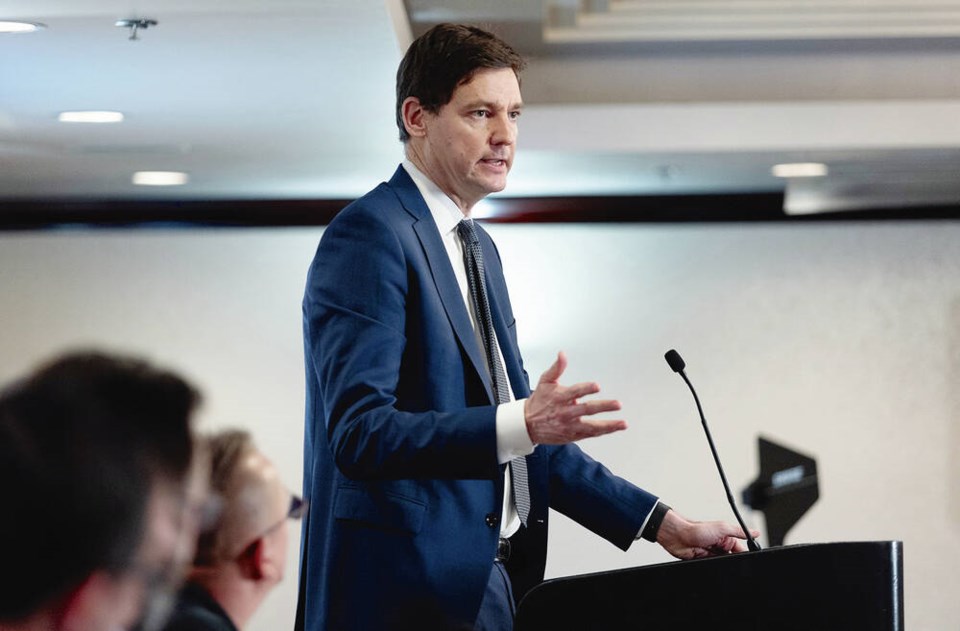As the number of delayed, cancelled and shut-down major projects in B.C. continues to mount, Premier David Eby appears content to stick with his prepared speaking points, regardless of changes happening in real time.
It’s a tell-tale sign the premier has entered campaign mode—and that we can expect to hear unwavering rhetoric about how the NDP support investment in B.C., irrespective of the years they’ve spent undermining the province’s resource development opportunities, including clean energy and critical minerals.
Last week at the Pacific Northwest Economic Region Conference in Whistler, the premier was making the rounds touting B.C.’s abundant natural resources and seeking investment to drive our clean energy future. However, the NDP’s long-time opposition to the Site C dam over a perceived lack of demand for power has returned to haunt them, with Fortescue’s $2 billion clean hydrogen project in Prince George essentially put on hold due to insufficient electricity supply.
Another inconveniently timed announcement while the premier was promoting resource development came from the Association for Mineral Exploration (AME), which released a damning summary report of recent engagement with mineral explorers, First Nations and stakeholder groups. In the Gitxaala vs. British Columbia case in September 2023, the court found that the Crown’s duty to consult Indigenous Peoples with asserted rights and title must begin when granting mineral claims. The province has since been tasked with making updates to the Mineral Tenure Act, which determines how mineral claims are staked in the province. The association’s report highlights feedback that government does not understand the changes it is proposing, industry doesn’t have a real seat at the table and if changes are implemented without the exploration industry, adverse outcomes are expected.
AME also found that, while challenging, implementing a system that consults with First Nations during staking can be done in a common-sense way. Sending a letter, picking up the phone and meeting with nations were all examples that prospectors use today. Ensuring fairness for prospectors and exploration companies is crucial to support the government’s Critical Mineral Strategy and ensure new mines are found.
As noted in the report: “The significance of this is highlighted by the fact that nine out of the 10 metals mines currently in operation in B.C. were discovered by prospectors, and one by a junior mining company. Major mining companies did not discover any of these.”
Any new system that adds barriers or costs will negatively affect critical mineral development in meaningful ways for decades to come. Such an indictment from industry members makes it understandably difficult for investors to consider B.C. as a stable and favourable jurisdiction for critical mineral development.
When government refuses to throttle spending to account for reduced revenue generation and tanks the province’s credit rating in the process, it’s increasingly worrying to consider where the money is expected to come from to afford the premier’s growing expenditures.
Looking at B.C.’s Major Projects Inventory is a good place to assess investment capital in the province, but it’s also where historic opposition to major projects by the NDP and their continued barriers to development are best illustrated.
In our province, the largest capital cost projects are unsurprisingly for oil and gas extraction, including LNG. Mining is listed just three spots behind and with a value of $35.6 billion, according to the fourth quarter 2023 report. Yet mining has the highest proportion of projects on hold compared to any other category. This is especially bad for those living and working anywhere outside of the Lower Mainland, because of all the projects on hold in the province, only 1.5 per cent are in the mainland and southwest, while 98.5 per cent are located elsewhere in B.C.
What’s holding up these much-needed mining projects is the NDP government’s usual regulatory barriers to development, but also their inability to make timely decisions on mining exploration permit applications, in some cases freezing decisions out of certain mine permitting offices for years. The reason is the province has been unwilling or unable to meet its duty to consult First Nations, which has delayed projects and kept much-needed development and revenue generation from British Columbians, while frustrating Indigenous groups, exploration companies and industry at large. This led Taranis Resources to sue the province in 2023 to force it to make a decision on its permit, which it eventually received after a prolonged legal battle that forced government’s hand.
On the back of the several LNG projects cancelled since 2017 in Prince Rupert and Kitimat, recent sawmill closures in Prince George, Bell Media layoffs and the overall disarray of affordable housing development, we know that when industry pulls out of B.C. for business decisions, the premier’s key messages follow a similar pattern: We’re disappointed, we’re frustrated, it’s not our fault.
The reality is that it isn’t only market forces or commodity cycles that are to blame for businesses’ disinterest in B.C.—it’s the government’s regulatory hurdles, permitting nightmares and uncertainty around engagement with First Nations. With just 12 weeks until the election, it’s time political opposition seized on the premier’s tired excuses and started holding him accountable while articulating real solutions to get projects in forestry, agriculture, prospecting and mining, oil and gas, and clean energy restarted and underway. This work must begin now, because after election day, there’s going to be a huge hole to climb out of with little revenue to do it.
Warren Mirko is a regulatory and public affairs consultant.



